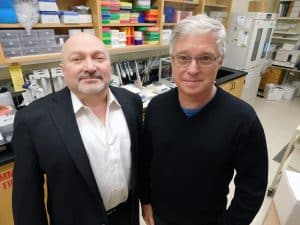Podcast: Play in new window | Download (Duration: 13:55 — 32.2MB)
Subscribe: Apple Podcasts | TuneIn | RSS | More

Texas Biomedical Research Institute scientists have been granted funding from the National Institutes of Health to pursue a promising study on the ultimate causes of heart disease and metabolic disorders. Principal Investigators Raul A. Bastarrachea, MD, and Jack W. Kent Jr., Ph.D., of Texas Biomedical Research Institute have designed the GEMM Family Study (Genetics of Metabolic Diseases in Mexico or Genética de las Enfermedades Metabólicas en México).
The GEMM Family Study examines volunteers from 10 university hospital sites in Mexico. Blood samples and tissue samples collected from participants are analyzed at Texas Biomedical Research Institute in San Antonio, Texas.
Healthy adults provide baseline blood samples and muscle biopsies at fasting. Then, they are given what’s called a meal challenge. The volunteers eat 30 percent of what their bodies need for their individual daily energy needs based on their Base Metabolic Rate (BMR) and activity level.

“The idea behind the GEMM Family Study is to pinpoint novel biomarkers of metabolic responses that could be early predictors of cardiovascular disease,” explained Dr. Bastarrachea. Distinguishing those biomarkers could lead to earlier diagnoses and interventions based on individual results.
Heart disease is a major health problem for Hispanic Americans. High rates of obesity, diabetes and high blood pressure put them at great risk for cardiovascular problems like strokes and heart attacks. The scientists anticipate that findings from the GEMM Family Study will have implications for diagnosing and treating cardiovascular disease on both sides of the U.S.-Mexico border.
The National Institute of Diabetes and Digestive and Kidney Diseases, part of the National Institutes of Health, has awarded the GEMM Family Study researchers $544,803 over two years to study data from 40 people in Mexico. Using that preliminary data, Texas Biomed scientists plan to apply for a larger NIH grant that would fund the study of data collected from 400 individuals.
Texas Biomed has a long history of researching genetic contributors to heart disease risk in family studies, including ongoing collaboration in the StrongHeart Study of American Indians.
The GEMM Family Study is being supported by the National Institute of Diabetes and Digestive and Kidney Diseases of the National Institutes of Health under Award Number R56DK114703.
This study will involve collaborative research by scientists at TBRI and UT Health San Antonio. Molecular analyses of gene expression will be conducted by the laboratory of Dr. Shelley Cole and the TBRI Genomics Sequencing Core. Other molecular profiling will be conducted at the UT Health Mass Spectrometry Laboratory under the supervision of Drs. Susan Weintraub and Xianlin Han.
The locations in Mexico where volunteers are taking part in the GEMM Family Study are:
- MONTERREY, Facultad de Enfermería, Universidad Autónoma de Nuevo Leon (UANL), Facultad de Salud Pública y Nutrición (Faspyn), UANL, Hospital Metropolitano Monterrey (Dr. Esther Gallegos and Dr. Edna Nava)
- MERIDA, Escuela de Ciencias de la Salud de la Universidad Marista de Mérida (Dr. Hugo Laviada and LN Maria Fernanda Molina)
- CUERNAVACA, Facultad de Medicina de la Universidad Autónoma del Estado de Morelos (Dr. Jesús Santa-Olalla and and Dr. Jose Ángeles Chimal)
- CHIHUAHUA, Facultad de Medicina de la Universidad Autónoma de Chihuahua (Dr. Irene Leal)
- MORELIA, Universidad Latina de América, Michoacán (Dr. Juan Carlos Castillo y Dr. Areli Murillo)
- GUADALAJARA, Instituto Superior Autónomo de Occidente, A.C., Universidad Católica (UNIVA), Hospital Salud de los Enfermos (Dr. Laura Gonzalez and Dr. Rocio Salinas)
- VERACRUZ, Instituto de Investigaciones Medico Biológicas, Universidad Veracruzana (Dr. José Maria Remes)
- CIUDAD VICTORIA, Hospital Infantil de Tamaulipas SSA (Dr. Judith Cornejo)
- SAN LUIS POTOSI, Facultad de Ciencias Químicas, Universidad Autónoma de SLP (Dr. Claudia Escudero)
- MEXICO, Facultad de Ciencias de la Salud Universidad Anáhuac México Norte, CDMX Hospital ISSSTE CDMX “Lopez Mateos” (Dr. Ernesto Rodriguez and Dr. Martha Eunice Rodriguez)
- INSTITUTO NACIONAL DE MEDICINA GENOMICA CDMX (Dr. Lorena Orozco, Dr. Angelica Martinez